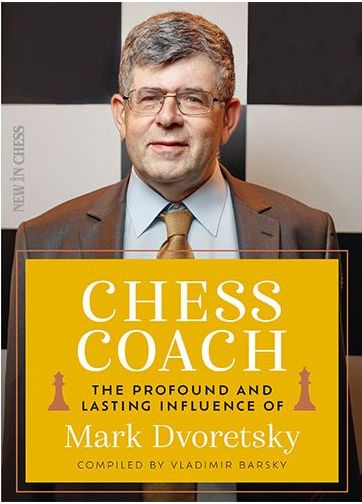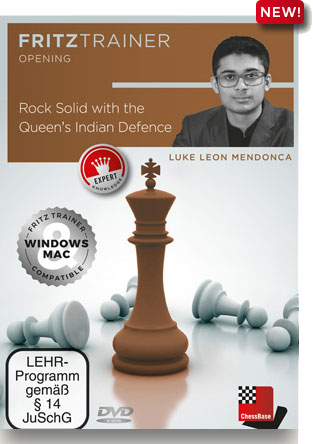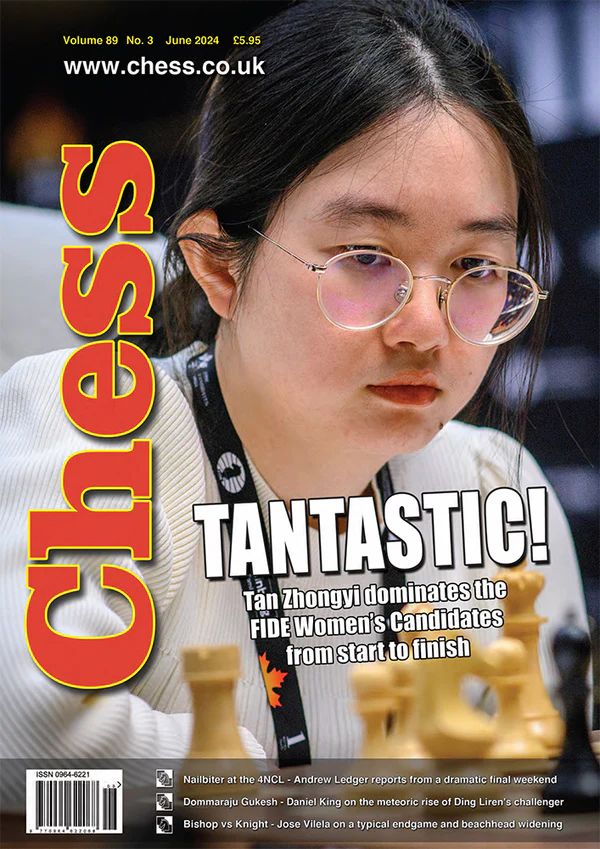 This new book from New in Chess, with its subtitle of ‘The Profound and Lasting Influence of Mark Dvoretsky’ (328 pages, £26.95, subscribers £24.25)– is a translation of the Russian original, published in 2018.
This new book from New in Chess, with its subtitle of ‘The Profound and Lasting Influence of Mark Dvoretsky’ (328 pages, £26.95, subscribers £24.25)– is a translation of the Russian original, published in 2018.
I am sure most of us would have first encountered Dvoretsky’s name when his groundbreaking Secrets of Chess Training (Batsford, 1991) was published. This, and the subsequent volumes in the series (and then with Olms and Russell Enterprises as the publishers, with some volumes published posthumously), changed the way in which chess students thought about chess, preparation and methods of honing endgame technique. The material was never easy or trivial and remains very demanding of the reader (although, as a further indication as to the relentless passing of time, thoughts on adjourned games have been rendered redundant). There is an abundance of excellent and interesting material to be found here, including Garry Kasparov’s heartfelt foreword, memories of Dvoretsky’s contemporaries, four sections of games, a selection of endgame studies, and a potpourri of interviews and articles with and about Dvoretsky.
Kasparov is full of praise for the subject. “It seems to me that Dvoretsky’s most striking achievements are in the study of endings: in minor-piece positions, he was able to more clearly demonstrate the advantages and merits of his methods. Not without reason, at the beginning of the 21st century, my favourite chess book was the brilliant Dvoretsky’s Endgame Manual, which has already gone through four English and two Russian editions!”
Fascinating material can easily be found in every section of this fine book. The interview segment is particularly interesting, as Dvoretsky was a very modest man in his own writings and here new angles are teased out by the interviewer. He agrees with Kasparov when it comes to naming his own best book and makes it clear as to why he never made more of a career out of playing chess.
“In playing, I wasn’t a good fighter, quite opposite to Carlsen! I couldn’t stand the nervous tension that a chess player has before a game. When I got success it was a pleasure to be a player. However, the process in itself was not enjoyable.” What we gained on the swings, we lost on the roundabouts, as he was more than capable of going toe-to-toe with chess giants, as this snippet shows.
33...Rxf2? According the book’s analysis, only the unlikely-looking 33...h5!! saves the game. As played, Dvoretsky refutes Polugaevsky’s attempted tactical blow by smoking out his king and chasing it down the board to its inevitable destruction.
34 Rh6+! Ke5 35 Qc5+! Ke4 “If 35...Rd5, 36 Re1+ decides the issue.”
36 Re1+ Kd3 37 Rh3+ 1-0
The book concludes with a potent summary of the subject’s achievements.
“It wouldn’t be an overstatement to say that Mark Dvoretsky was single-handedly responsible for uplifting the level of chess education with his articles and books towards the end of the 20th and beginning of the 21st century. [...] Mark is no more, but his books, articles and teachings will continue to educate, enlighten and entertain the chess world.”
It is rare indeed for a trainer to touch the chess lives from the range of world champions to club players. This book protects the legacy of the great Mark Dvoretsky and is highly recommended.
In the CHESS Magazine Shop
 A Supergrandmaster’s Guide to Openings Vol.1: 1.e4
A Supergrandmaster’s Guide to Openings Vol.1: 1.e4
Anish Giri, PC-DVD; running time: 3 hours, 19 minutes RRP £44.95 SUBSCRIBERS £40.45
In conversation with Mr ChessBase India, Sagar Shah, Anish Giri discusses all the main openings after 1 e4. As such, viewers get to hear a super-GM’s take on those lines they frequently reach and while some of his insights are fairly deep, others will very much help the club player. Shah certainly does a good job of stopping Giri from quoting too many lines of lengthy analysis, while they discuss various repertoire options and examine one of Giri’s favourite games in each of the main openings covered.
There’s also a companion DVD,A Supergrandmaster’s Guide to Openings Vol.2, which follows the same format, but this time covers all the queen’s pawn openings, as well as the English and Reti. Shah and Giri again interact well and present several repertoire suggestions as they work their way through the 1 d4 openings, with this second volume running to three hours and 35 minutes of coverage, while retailing at £44.95 or £40.45 for Subscribers. It’s also possible to purchase both volumes of A Supergrandmaster’s Guide to Openings from Chess & Bridge for the special price of £79.95 or £71.95 for Subscribers.
 Rock Solid with the Queen’s Indian Defence
Rock Solid with the Queen’s Indian Defence
Leon Mendonca, PC-DVD; running time: 4 hours, 20 minutes RRP £32.95 SUBSCRIBERS £29.65
This DVD could easily have been presented by Sergei Tiviakov, but is actually from 18-year-old Indian star Leon Mendonca, who boasts a 2640 rating and has quite a solid style for one so young. One of his favourite openings is the venerable 1 d4 Nf6 2 c4 e6 3 Nf3 b6, with which he maps out a fairly comprehensive and solid repertoire for Black, most notably based around the lines 4 a3 Bb7 and 4 g3 Ba6.
 About CHESS Magazine
About CHESS Magazine
The above review is reproduced from Chess Magazine June/2024, with kind permission.
CHESS Magazine was established in 1935 by B.H. Wood who ran it for over fifty years. It is published each month by the London Chess Centre and is edited by IM Richard Palliser and Matt Read.
The Executive Editor is Malcolm Pein, who organises the London Chess Classic.
CHESS is mailed to subscribers in over 50 countries. You can subscribe from Europe and Asia at a specially discounted rate for first timers, or subscribe from North America.


















 This new book from New in Chess, with its subtitle of
This new book from New in Chess, with its subtitle of 
 Rock Solid with the Queen’s Indian Defence
Rock Solid with the Queen’s Indian Defence About CHESS Magazine
About CHESS Magazine




